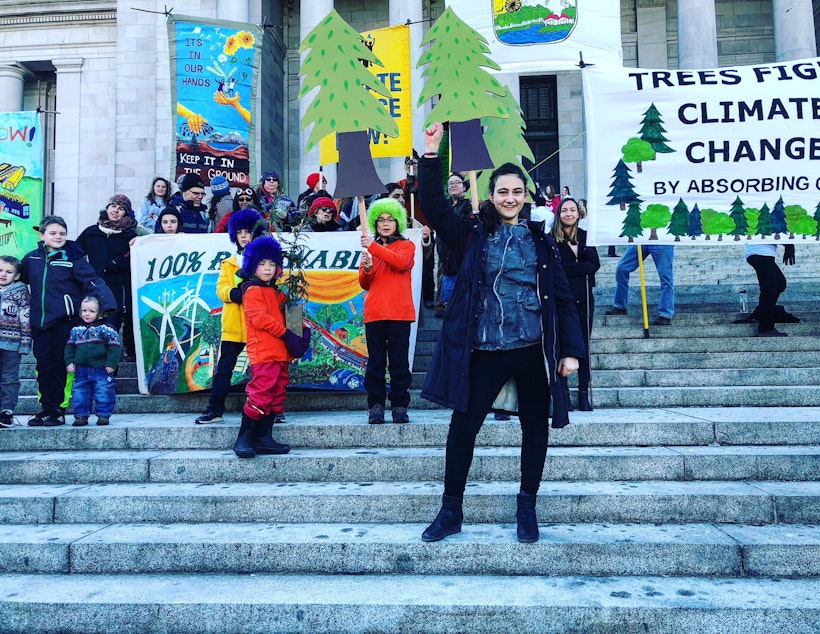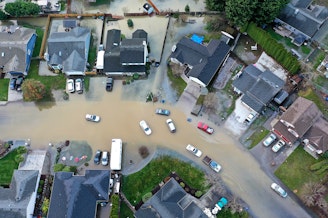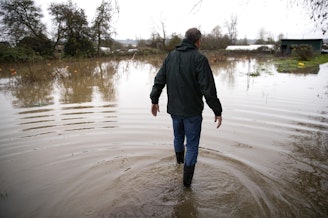One Seattle teen's climate change moment: 'Screw this. I have to take action'

Who will inherit the earth? And what kind of earth will that be?
As part of #CoveringClimateNow, the global media project to bring attention to the story of climate change, KUOW’s Angela King spoke with Seattle high school senior Jamie Margolin.
Margolin founded the climate justice movement Zero Hour with friends back in 2017. She just testified to Congress, and she was at the global climate strike in New York on Friday.
How she went from worrying about climate change to doing something about it:
That moment was the 2016 election. I mean there was stuff definitely building up that made me realize that I have to take action -- not only are leaders not doing sufficient on this, they're actively making the climate crisis worse. That frustration was building up, and the 2016 election was the final straw. After kind of wallowing in depression for a little bit about the results I was like, “Screw this. I have to take action. Our leaders are not going to do enough.”
A recent Washington Post Kaiser Family Foundation poll found about half of teens reported feeling afraid and helpless. Her advice to them:
Sponsored
The way I keep them motivated is providing events that are both powerful and fun. It's one thing to just sit in your room alone and call up representatives -- that can be really lonely and taxing. But for me like stuff like the climate strikes -- those are powerful, those are solemn, because we are mourning a lot of the people and places and animals lost in climate disasters and environmental destruction, but also it's community and celebration and fun to be out in the streets and holding up signs and meeting people who are like minded and and feeling like you're a part of something bigger than you. I say finding community in the action is the antidote.
On her faith in the older generation to get things done -- from politicians to business owners to parents:
It really depends who you're talking about. Indigenous communities that have literally been doing this for centuries and so I'm someone who believes in intergenerational organizing, so it's not about pitting generations against each other but when it comes to politicians and people in power, it's hard to have faith in them. Zero Hour just was lobbying for three days straight on Capitol Hill. I did my testimony, we met with (House Speaker) Nancy Pelosi, she gave us like a full hour. But a little over a year before that we had Zero Hour’s 2018 lobby day, and I was hearing the same talking points and the same “we're going to do something” that I was hearing in 2018. So it's a bit discouraging when you go to the same place in the same meeting rooms again with the same people and you kind of like, "OK what changed? It's been a year."
On the most effective form of action for other teens to take on climate change:
I'd say actually influencing their parents’ votes, if they are from a family that has the privilege to vote in the United States. There have been tons of studies done on this. No one has a bigger influence on someone's vote than their kids. And a lot of times parents will not maliciously be like, “Which politician can I vote for that will crap on my child's future the most.” It's just that there's a lack of education and a lack of consideration for this. So if a child pulls their parents or parents or guardians or whatever their family situation is and really talks them, has a candid conversation, not just about presidential candidates but Senate, Congress, local city council, all of that … be engaging (with) your parents and engaging the family members around you on who you think they ought to vote for, why the climate issues which policies are actually good and bad. Striking, it's something that a lot of kids are already doing and I would encourage more kids to do so. But I really think the ultimate action is really influencing the people around you to be voting the right way.
Sponsored
On how to talk to younger children about climate change:
So I have two instances of that. I went to give a presentation at my old middle school and this one girl raised her hand. She was in fifth grade and she looked really scared, like she was about to cry and I wasn't there to like scare them but I didn't hold back from the truth and I was made sure to be empowering in my conversation.
But there is only so much happy-go-lucky talk you can do when it comes to the literal end of the world. So she raised her hand.
And she was like, “Do you think we're actually going to make it? Will we make it?”
I did not have an answer for her. And I had to be honest because I don't know and I was just like I don't know, I hope so. And I felt terrible because then she looked terrified and I said the goal is not to scare little children but how can I lie to them.
And even high schoolers: I was swarmed by these girls at my school, and they were just like, “I stay up awake crying about this all the time. Do you think we're going to make it?”
And I again I didn't have an answer. We better. I hope so. That's what I'm working for. But how can I guarantee anything on the current trajectory that we're on?
This story is part of #CoveringClimateNow, a global media project to bring attention to the story of climate change. You can see all of KUOW's coverage here.




